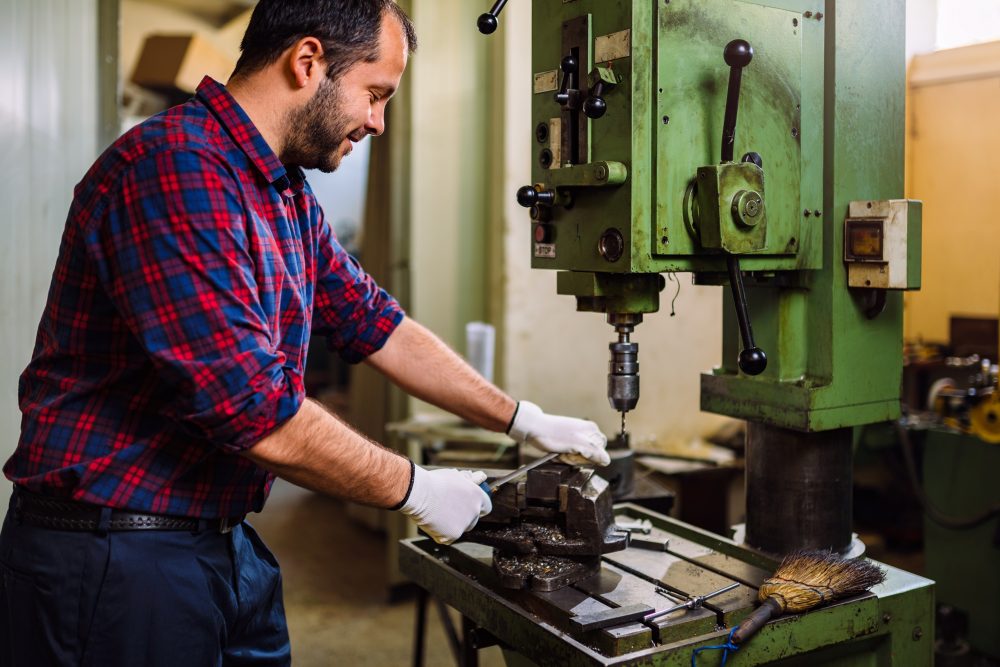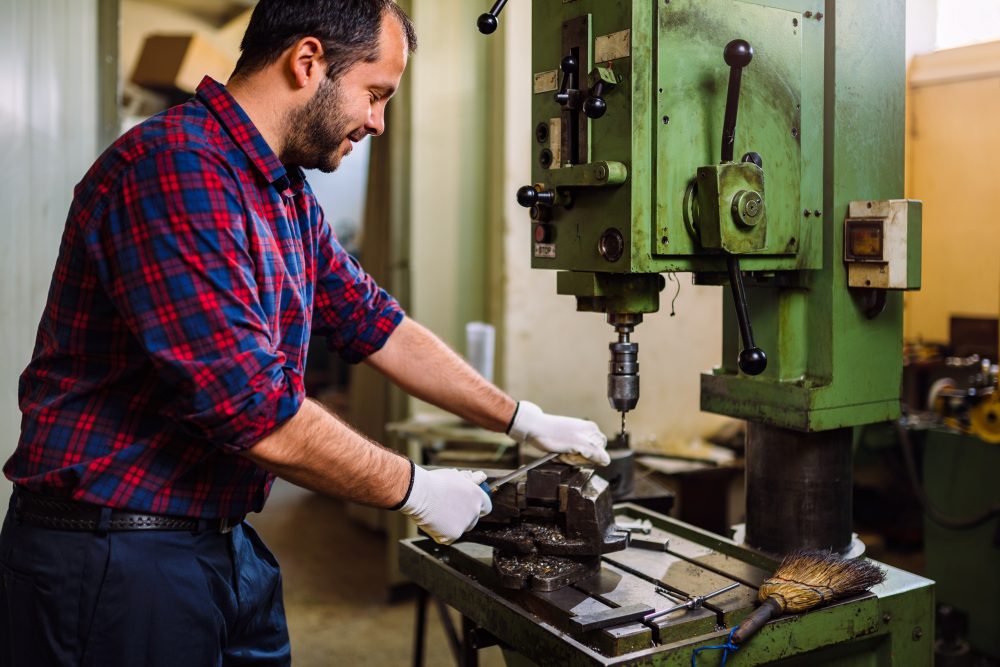Are you wondering whether you can use a drill press for metal? Well, my friend, I’ve got the answer for you.
Now, before we dive into the nitty-gritty, let’s make sure we’re on the same page. A drill press is a handy tool that helps make precise holes in various materials. But can it handle the tough stuff like metal? Let’s find out!
Using a drill press for metal is absolutely possible. In fact, it’s a popular choice among DIY enthusiasts and professionals alike. With the right setup and some know-how, you can drill through metal with ease. But, there are a few key things you need to keep in mind.
Let’s get our metalworking adventure started and explore the ins and outs of using a drill press for metal! But first, safety goggles on, my friend, because safety always comes first. So, buckle up, and let’s dive into the world of metal drilling with a trusty drill press!
Looking to work with metal using a drill press? Absolutely! A drill press can be used for metal with the right tools and techniques. Choose high-quality drill bits specifically designed for metalworking, set the drill press at the appropriate speed, and apply consistent pressure as you drill. Keep the drill bits lubricated to prevent overheating. With proper care and technique, your drill press can handle metal projects effectively.

Can You Use a Drill Press for Metal?
Using a drill press for metalworking tasks is a common question among DIY enthusiasts and professionals alike. Drill presses are versatile tools that are primarily designed for woodworking, but they can also be used for drilling holes into various materials, including metal. In this article, we will explore whether it is feasible to use a drill press for metal and provide you with the necessary information and tips to ensure successful metal drilling projects.
Understanding Drill Presses
A drill press is a stationary power tool that consists of a base, a column, a table, and a spindle which holds the drill chuck. It offers precise drilling capabilities by allowing you to set the depth and angle of the drill bit and provide consistent drilling performance. The motor in a drill press rotates the spindle, which in turn rotates the drill bit to cut through the material.
When it comes to drilling metal, there are a few considerations to keep in mind. First, it’s important to choose the right drill bit for the job. High-speed steel (HSS) or cobalt drill bits are usually recommended for drilling through metal due to their durability and heat resistance. Additionally, using cutting oil or lubricant can help prolong the life of the drill bit and improve the overall drilling experience.
Benefits of Using a Drill Press for Metal
Using a drill press for metalworking tasks offers several advantages. Firstly, the drill press provides stability and precision, ensuring accurate drilling without the risk of slippage. This is especially important when working with metal, as any mistakes can lead to damage or injury. The adjustable depth stop feature allows you to control the drilling depth, making it ideal for creating consistent holes in metal objects.
Furthermore, a drill press allows for the use of different drill bit sizes and types, giving you the flexibility to work on various metal projects. From small pilot holes to larger diameter holes, the drill press can accommodate a wide range of drill bit sizes. The ability to adjust the drill speed also adds to the versatility, as different metal types require different drilling speeds for optimal results.
Tips for Drilling Metal with a Drill Press
To achieve the best results when using a drill press for metal, there are a few tips that you should keep in mind. Firstly, it is crucial to secure the metal workpiece firmly to the drill press table to prevent any movement during drilling. This can be done using clamps or a vise depending on the size and shape of the object.
Secondly, using a cutting oil or lubricant is highly recommended when drilling metal. The lubricant helps to reduce friction, prevent overheating, and prolong the life of the drill bit. Apply a small amount of lubricant to the area being drilled and periodically throughout the drilling process.
Lastly, it’s important to select the appropriate drill bit for the specific metal being drilled. High-speed steel or cobalt drill bits are generally the go-to choice for drilling through various types of metal. However, for harder metals like stainless steel or titanium, carbide-tipped drill bits are the preferred option.
Pros and Cons of Using a Drill Press for Metal
Benefits:
– Precise and accurate drilling for consistent results.
– Versatility in terms of drill bit sizes and types.
– Adjustable drill speed to match the metal being drilled.
– Stable and secure drilling platform for enhanced safety.
Drawbacks:
– Limited vertical drilling depth compared to handheld drills.
– Size restrictions due to the space between the drill press table and the spindle.
– Requires a dedicated workspace and setup due to its stationary nature.
– May not be suitable for extremely hard or thick metals.
Choosing the Right Drill Press for Metalworking
Types of Drill Presses:
1. Benchtop Drill Press: Ideal for small shops or limited workspace, offering portability and maneuverability.
2. Floor Standing Drill Press: Suitable for heavy-duty tasks and larger workpieces, providing stability and power.
3. Magnetic Drill Press: Designed for drilling on vertical and horizontal surfaces, using a magnetic base for increased stability.
When selecting a drill press for metalworking, consider the power, drilling capacity, and durability of the machine. Ensure that it has the necessary features, such as adjustable speed settings, a solid construction, and a reliable chuck system. Additionally, read customer reviews and compare different brands and models to make an informed decision.
Maintaining Your Drill Press
To ensure optimal performance and longevity of your drill press, regular maintenance should be performed. Clean the drill press table and remove any debris after each use. Lubricate the moving parts, such as the spindle and column, to prevent rust and ensure smooth operation. Periodically check the belts, bearings, and other components for wear and tear, and replace them if necessary.
In conclusion, while drill presses are primarily designed for woodworking, they can definitely be used for drilling through metal with the right techniques and considerations. By selecting the appropriate drill bit, using lubrication, and following proper drilling practices, you can achieve accurate and precise results on your metalworking projects. Always prioritize safety and choose the right drill press for your specific needs to ensure successful metal drilling experiences.
Key Takeaways: Can You Use a Drill Press for Metal?
- Yes, you can use a drill press for metal.
- Make sure to use the appropriate drill bits for metal.
- Secure the metal piece tightly to avoid any movement while drilling.
- Use lubrication to reduce friction and heat during the drilling process.
- Always wear safety goggles and gloves when working with metal on a drill press.
Frequently Asked Questions
In this section, we will answer some commonly asked questions related to using a drill press for metal.
1. Can I use a drill press for metal projects?
Yes, a drill press is a versatile tool that can be used for a variety of projects, including metalworking. However, it is important to choose the right drill bits and set the appropriate speed for drilling into metal. Metal drilling requires using high-speed steel or carbide drill bits specifically designed for metal. Regular wood drill bits are not suitable for drilling through metal as they can quickly become dull or break. Additionally, metal drilling requires reducing the drill press speed to avoid damaging the bits or workpiece. Always refer to the manufacturer’s guidelines for the correct speed settings when drilling metal.
Moreover, it is crucial to secure your workpiece properly and use appropriate safety measures when drilling into metal. This will ensure precise and safe drilling for your metal projects.
2. Are there any limitations when using a drill press for metal?
While a drill press can be used for metal projects, it does have some limitations. Firstly, the size of the drill press and the throat depth (distance between the chuck center and the column) can limit the size of the metal piece you can work with. If you’re planning to work on larger metal pieces, you may need a larger drill press with a greater throat depth to accommodate them.
Furthermore, a drill press may not be suitable for certain types of metalworking, such as milling or shaping metal. These tasks require specialized machinery like milling machines or metal lathes. A drill press is primarily designed for drilling holes in metal, so keep this in mind when planning your metalworking projects.
3. What factors should I consider when choosing a drill press for metal?
When choosing a drill press for metal projects, there are a few key factors to consider. Firstly, ensure that the drill press has a suitable speed range for metal drilling. Metal drilling typically requires higher speeds than woodworking, so look for a drill press with adjustable speed settings and a high maximum speed.
Additionally, consider the throat depth or the distance between the chuck center and the column. If you plan to work on larger metal pieces, you’ll need a drill press with a greater throat depth to accommodate them. Also, check the power and stability of the drill press to ensure it can handle the demands of drilling into metal.
4. Do I need special drill bits for drilling into metal with a drill press?
Yes, it is important to use special drill bits designed for metal when drilling into metal with a drill press. High-speed steel (HSS) and carbide drill bits are commonly used for metal drilling as they are more durable and can withstand the heat generated while drilling through metal. These bits are designed with a sharper cutting edge to effectively drill into metal surfaces.
It is essential to select the appropriate drill bit size for your specific metal drilling needs and to choose bits that are compatible with your drill press chuck size. Always refer to the drill bit manufacturer’s guidelines for proper usage, and replace worn or damaged bits to ensure safe and efficient drilling.
5. Are there any safety precautions I should take when using a drill press for metal?
Absolutely! Safety should always be a top priority when using a drill press for metal. Make sure to wear proper eye protection, such as safety goggles or a face shield, to protect your eyes from flying metal chips or debris.
It is also recommended to wear gloves to protect your hands during drilling operations. Keep loose clothing, jewelry, and long hair secured to prevent them from getting caught in the machine. Always clamp your workpiece securely to prevent it from spinning or moving during drilling. Furthermore, be aware of the potential for hot metal chips being expelled from the drill hole and take appropriate measures to prevent any burns or injuries.

Summary
So, can you use a drill press for metal? Yes, you can! A drill press can be a useful tool for drilling holes in metal, as long as you use the right bit and set the correct speed. Make sure to use a slower speed and lubrication for better results. Also, be cautious of the heat generated and take necessary safety precautions. Remember, practice makes perfect, so don’t be afraid to give it a try and see what you can create!
In conclusion, using a drill press for metal is possible, but it’s important to follow the right steps and be mindful of safety. With the right approach and practice, you’ll be able to drill precise holes in metal with ease. So, go ahead and unleash your creativity with this versatile tool!
